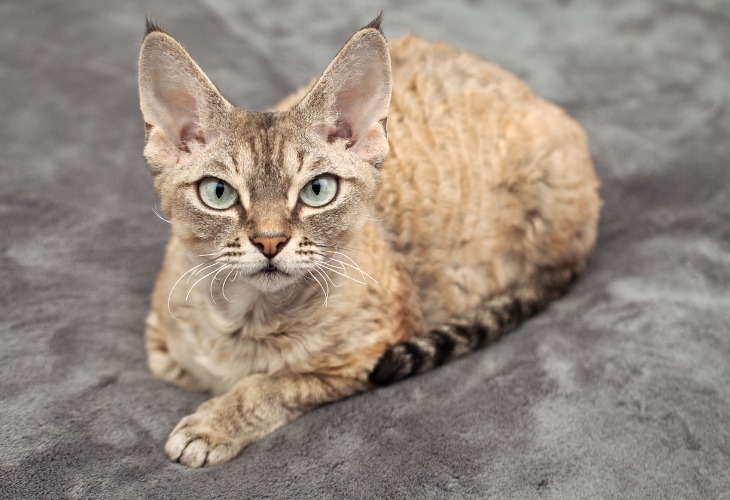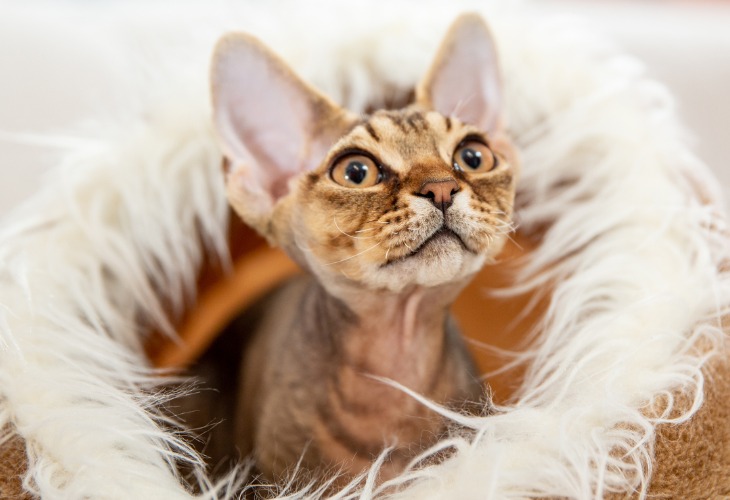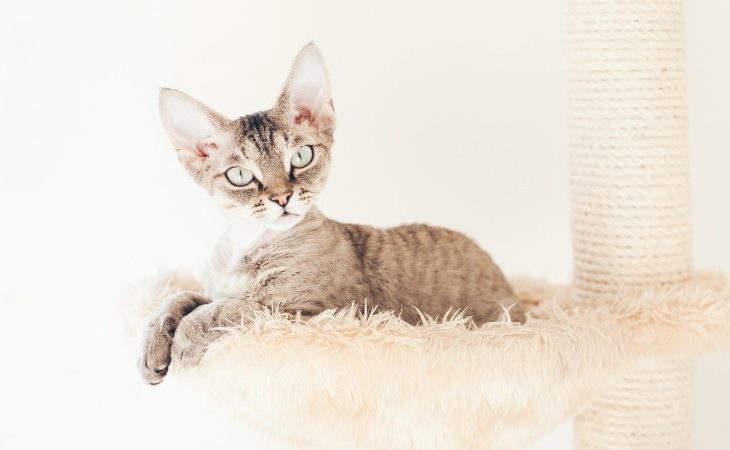Breed standards: CFA, FIFe, TICA, AACE, ACF, ACFA/CAA, CCA-AFC, GCCF | Size: Moyenne | Life expectancy: 15+ years | Temperament: Energetic and lively | Coat: Short | Origin: United Kingdom.
The Devon Rex is a cat breed with a curly coat and a pixie-like appearance. They are known for being friendly, affectionate, and playful.
The origins of the Devon Rex
A rather unique story
The origins of the Devon Rex are traced back to the 1960s in the United Kingdom. At that time, a colony of abandoned alley cats lived in a mine in Buckfastleigh, Devon, a county in the southwestern part of the United Kingdom. In this group of stray cats, a male with an unusual curly-haired coat was spotted. The male cat mated with a domestic cat with a tortoiseshell white coat. The female gave birth to several kittens among which was a male kitten with the same fur as his father. Impressed by the appearance of his coat, the owner of the mother cat, Beryl Cox, took in the kitten. She named him Kirlee.
Beryl Cox noticed that the curly-haired cat that she found resembled the Cornish Rex. She decided to sell this cat to a Cornish Rex breeder. However, crosses between Kirlee and the Cornish Rex produced only wire-haired kittens. Cat breeders realized that the gene responsible for Kirlee’s coat was different from that of the Cornish Rex. They concluded that Kirlee belonged to a new breed, which they named Devon Rex.
Maintaining the genetics of the Devon Rex
Kirlee was unfortunately killed in a car accident. Before his tragic passing, the Devon Rex’s ancestors were crossed with several breeds of cats in order to maintain his genetic heritage. These crosses resulted in offspring that attracted the attention of other breeders for the development of the breed.
Conquering the world
The Governing Council of the Cat Fancy (GCCF) officially recognized the Devon Rex as a breed in 1967. It wasn’t until around 10 years later before The International Cat Association (TICA) recognized the breed in 1979. A few years later, the Cat Fanciers’ Association (CFA) officially recognized the breed in 1983.
Today, the Devon Rex is popular worldwide. In England, the GCCF registers about 300 of them per year. This organization ranks them 10th out of a total of 40 registered breeds. In the United States, it is the 10th most popular breed out of 47 (in 2014).
The Devon Rex’s personality
Qualities
This cat breed is a intelligent, lively, and happy. It is a very energetic and playful cat breed. They become attached to their owner and to all members of the family. They are very friendly to any visitor or stranger who enters your home. Furthermore, their sympathy for humans makes them an excellent therapy cat, able to soothe people under stress. They are curious and attentive pets who like to explore their environment and observe everything that is going on around them.
The Devon Rex is an excellent playmate for children. They enjoy playing with them for hours on end. Nevertheless, your children should not disrespect him by pulling his tail for example.
They are very sociable and enjoy the company of other pets such as dogs, cats, birds, reptiles, and even rodents. Moreover, they adapt to new environments easily. You can easily make a Devon Rex your travel companion.

Shortcomings
Their short coat makes them sensitive to the cold. Don’t be surprised if your cat frequently sleeps on the radiator or comes to spend his or her nights on the bed with you.
The Devon Rex is a cat totally dependent on humans and does not like to be alone. Moreover, they have a short and quiet voice, which leads them to resort to trickery if they want to claim something from you.
Although they are full of energy, they are not meant to live outside. It is, therefore, necessary to provide him or her with toys and even a cat tree so that he or she can burn off their energy.
The Devon Rex is a greedy cat who does not hesitate to invite itself to the table at mealtime. You will have to be very careful with this breed if you don’t want him or her to steal some of your food.
The physical characteristics of the Devon Rex
General appearance
The Devon Rex is a medium-sized cat with an atypical appearance that makes it look like a pixie.
Head
The head of the Devon Rex is quite distinctive. It has a flat skull when seen from the side. The forehead is rounded and followed by a clear break at the level of the nose at the height of the eyes. Seen from the front, its head is shaped like a series of three convex arcs formed by the lobes of its ears, its prominent cheekbones, and its powerful muzzle.
The eyes are oval-shaped and are large. They can be of any color, but always in accordance with the coat. Large, long, conical, and spread ears are set very low. They are rounded at the end. It is especially the ears that give the cat its pixie-like appearance.
It is possible for a Devon Rex to not have whiskers. However, if they are present, they are short and brittle.

Body
This atypical cat has a firm and muscular body with a wide and open chest. The body of the cat stands on long, high legs. They are moderately thin compared to the body, but they have powerful muscles and end with small oval paws. In addition, they have a long and thin tail. A thin, muscular neck separates the head from the shoulders.
Devon Rex: coat, color, and care
Coat
The coat is fine and soft to the touch. It is made up of short and curly hairs. The curl of the fur is dense and untidy. However, this density varies from one part of the body to another. The upper parts of the body are hairier than the lower regions.
Young Devon Rexes can have bare areas covered with fine down. Regarding the fur covering the head and the neckline, it is not curled because it is too short.
All colors and patterns are accepted for this cat’s coat.
Caring for the Devon Rex
With its short coat, you won’t have to worry too much about its maintenance. A light brushing and weekly ear cleaning will be enough to keep this cat breed healthy and beautiful.
Furthermore, it is recommended to bathe them once a year. However, if you have a Devon Rex that sweats a lot with excess sebum, especially on the paws, you will have to get him or her used to a monthly bath.
It is also necessary to check the cleanliness of the teeth and eyes every week to avoid infections or detect them quickly.
The Devon Rex at a glance
Size: medium.
Weight: between 3 and 5 kg (6 and 11 lbs).
Health: The Devon Rex is sensitive to temperature changes, especially the cold. Its skin is also sensitive to infections. Genetically, the breed is predisposed to myopathy.
Is the Devon Rex good with children? This breed is very playful and easily adapts to the presence of children. They will have fun with them as long as they do not push them around too much.

